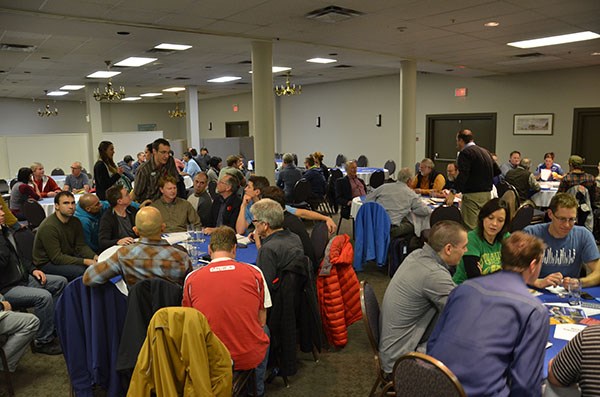Outdoor enthusiasts came off the trails, mountains and water to dive into Squamish politics on Monday night (Nov. 3).
Squamish’s recreation groups sat down for what was like a speed-dating session with the municipal candidates. The event, which was organized by the Squamish Off-road Cycling Association (SORCA), saw candidates rotate through the tables representing different organizations.
A frequent question was: How does the District of Squamish protect and enhance outdoor recreation resources? As development ramps up in town, the community’s mountain bike trails are feeling the wear, said SORCA president Jeff Cooke. While a large chuck of the trail system is on private land and lots outside of the municipal boundary, the routes draw an estimated $8 million into the local economy, reported a SORCA study this year.
“How do we take pressure off those trails?” he asked, noting logging operations and independent power projects are a constant threat.
Squamish residents need to come to a consensus on what they value about this community, incumbent Coun. Doug Race said. If officials get a community census on residents’ vision, then council will be able to outline acceptable and unacceptable impacts on outdoor recreation, he said.
Council candidate Glenne Campbell said the district should include trail maintenance in the municipal budget as a line item.
The district could expand its boundary to include some of the community’s vital recreation resources, council candidate Rob Weys suggested, to have more say over the future direction of the land and operations.
The district is eying creating its own community forest, incumbent Coun. Ted Prior noted, adding that would provide it with more control.
The district needs to manage urban sprawl to protect its outdoor lifestyle, said council candidate Karen Elliott. Managing Squamish’s recreational resources is not just about the assets but also preserving the experience of them, she said.
If the proposed Woodfibre liquefied natural gas plant gets the green light, council candidate Brad Hodge said he’d want to ensure a portion of the estimated $2 million in municipal tax revenue from the project is earmarked for specific recreation projects.
The district needs to look at more creative funding solutions, said incumbent Coun. Susan Chapelle. She suggested Squamish follow Whistler’s lead and use a slice of its hotel tax toward recreation.
Mayoral candidates incumbent Mayor Rob Kirkham and Coun. Patricia Heintzman tackled the ongoing recreation user fee debate. Recreation user fees were last increased 11 years ago. In 2011, municipal officials instructed staff to come up with a new charging policy, but three years later, recreation groups and the district are at a standstill.
Rec centre and field users need to sit down and figure out the fees among themselves, said Heintzman. The district’s current process pitted user groups against one another rather than solving the issue, she noted. “Now these groups aren’t talking to each other.”
Kirkham had the same train of thought. He’d like to set up a recreation commission in which all the user groups understand the municipality’s budget restrictions and work within those parameters to create solutions.
“All of these assets require a lot of money,” Kirkham noted.
Squamish water sports groups stressed the need for continued and improved access to the ocean and rivers. The district needs to start looking at development from a holistic point of view, rather single projects, council candidate Auli Parviainen said.
Proper access to all waterfronts, including riverfronts in Squamish, was recommended to council by the Long Term Tourist Committee in 1979, said council candidate Eric Andersen.
Council candidate Paul Dosanjh said the municipality should work closely with groups to promote important assets and sustainability.
The district needs to empower volunteer groups to manage and develop Squamish’s outdoor recreation resources, council candidate Chris Pettingill said.
As a professional golf instructor, council candidate Scott Wengi said he understands the importance of the community’s recreational resources. Residents choose to tag Squamish as the outdoor recreation capital of Canada and it’s a title officials need to build upon, he said.
Squamish’s access to the outdoors is what makes it unique, incumbent Coun. Bryan Raiser said.
At the introduction portion of the event, council candidate Terrill Pattersen stood at the microphone with a tissue across his face. He said too much of council’s business has occurred behind closed doors.
“It’s time to remove the veil,” he said, before lifting the tissue away from his face.
Council candidate Peter Kent reiterated Pattersen’s sentiment. He said he wants to bring good governance to council’s chamber and this includes an open door policy.
It is a councillor’s job to be available to the public throughout the term in office, council candidate Jason Blackman-Wulff said. Councillors can liaison between user groups and staff, he said.
Council candidate Phil Audet also said better communication is needed between end users, industry and private landowners, he said.
Volunteer recreation organizations provide great economic returns to the community and it’s time for them to be included in discussions, council candidate Stephen Fryer said. The district needs to build upon what is already in its own backyard, he said.
Mayoral candidate Ron Bahm said the district needs a recreation centre that is more inclusive of all interest groups. Bahm told a group of students from Coast Mountain Academy that the rec centre should become more multi-functional.
“We need a place kids can go and hang out,” Bahm said.
Youth should get in touch with Squamish’s many outdoor recreation’s groups to build upon synergies, council candidate Debra McBride said. Council candidates Kevin Jewell did not attend the meeting.



